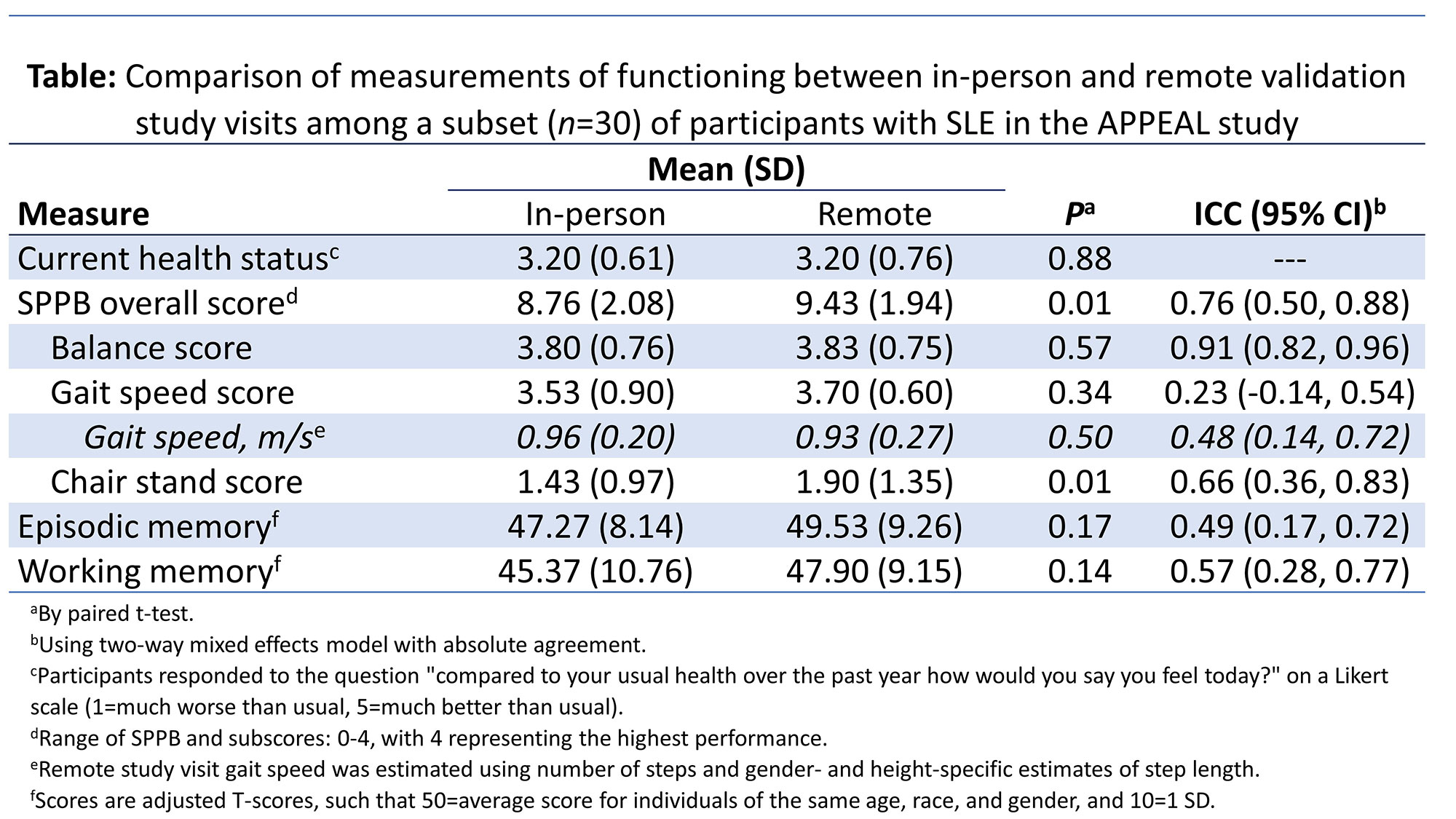Session Information
Session Type: Poster Session C
Session Time: 1:00PM-3:00PM
Background/Purpose: The disruption of the COVID-19 pandemic presented an opportunity for researchers to develop and administer remote versions of measures for ongoing studies. In an ongoing ancillary study [Approaches to Positive, Patient-centered Experiences of Aging in Lupus (APPEAL)] of individuals with systemic lupus erythematosus (SLE), we modified and remotely administered physical performance and cognitive functioning measures that had previously been administered in-person. Here, we sought to validate these remote versions of functioning measures in a subset of participants who presented for a study visit after our return to in-person research operations.
Methods: APPEAL participants were recruited from the population-based Georgians Organized Against Lupus cohort study. A subset of participants (n=30) who completed in-person study visits (11/18/21-3/3/22) completed a second, remote (Zoom-based) validation visit (12/7/21-3/10/22; 4-28 days between visits), including remote measures of physical and cognitive functioning that had been used for remote visits. Current health status was obtained via a five-item Likert Scale (1=much worse than usual, 5=much better than usual) for both visits. Physical performance was measured by the Short Physical Performance Battery (SPPB); for validation visits, a 1-minute walk-in-place was substituted for the 4-meter gait speed and participants used chairs found at home for chair stands. Episodic and working memory were measured using the NIH Toolbox; remote versions were conducted with the interviewer manipulating the iPad. Descriptive statistics with paired t tests were calculated for all measures. To measure test-retest reliability, two-way mixed effects models were used to obtain intraclass correlation coefficients (ICCs).
Results: Current health status did not statistically significantly differ between study visits, with 27/30 (90%) participants reporting either the same or a one-level difference at their remote validation visit (Table). Overall SPPB and chair stand scores, but not gait speed or balance scores, were statistically significantly lower for in-person vs. remote visits. Episodic and working memory scores were higher in remote vs. in-person visits, but the differences were not statistically significant. The ICCs for most measures indicated moderate agreement (Table).
Conclusion: Overall, measures of physical performance or cognitive functioning were fairly similar between in-person and validation study visits and showed moderate reliability. Non-standardized equipment (e.g., chairs used), errors in estimation vs. measurement (e.g., walking speed from number of steps), and potential task learning (e.g., cognitive measures) may have contributed to observed differences. Given these results, data for some functioning measures from in-person and remote study visits could be reasonably combined in future analyses. Further, remote administration of functioning measures in research studies, which could expand and diversify pools of potential study participants, could be considered for future studies.
To cite this abstract in AMA style:
Hoge C, Bowling C, Dunlop-Thomas C, Pearce B, Lim S, Drenkard C, Plantinga L. Validation of Remote Physical Performance and Cognitive Functioning Measures Among Individuals with Systemic Lupus Erythematosus [abstract]. Arthritis Rheumatol. 2022; 74 (suppl 9). https://acrabstracts.org/abstract/validation-of-remote-physical-performance-and-cognitive-functioning-measures-among-individuals-with-systemic-lupus-erythematosus/. Accessed .« Back to ACR Convergence 2022
ACR Meeting Abstracts - https://acrabstracts.org/abstract/validation-of-remote-physical-performance-and-cognitive-functioning-measures-among-individuals-with-systemic-lupus-erythematosus/

